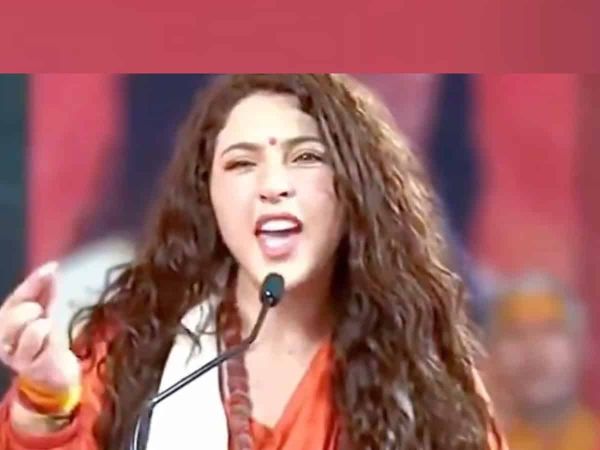
In yet another instance of hate speech in the country, former Miss India Ishika Taneja sparked a huge controversy after delivering a deeply inflammatory and provocative speech that explicitly targeted the Indian Muslim community.
Taneja peddled the hate-filled narrative while speaking at a religious gathering attended by several prominent Hindu religious priests during the ongoing Maha Kumbh in Uttar Pradesh’s Prayagraj. She delivered derogatory descriptions that perpetuated untrue stereotypes about Indian Muslims.
In a video that has surfaced on social media platforms the former Miss India is heard referring to Muslims as “Babur ki aulad” (children of Mughal emperor founder Babur) and claiming that a “pinch of vermilion” could protect against social issues she associated with Muslims, including “halala, triple talaq and love jihad”.
“Yai Babur ki aulade kya jane Sindoor ki kimat kya hai, yai love jihad halala aur triple talaq jaise chezoun se bachata hai,” (Babar’s children don’t know the value of a pinch of vermilion. A pinch of vermilion saves us from halala, triple talaq, and love jihad”, she said.
“Love jihad” is a conspiracy theory that accuses Muslim men of intentionally and strategically alluring and entrapping non-Muslim women with the intent to “convert them” to Islam and marry them as part of an “Islamisation project”. Halala is a derogatory narrative against Muslims fabricated by right-wing Hindus to stigmatize Islamic practices.
During this speech which took place in front of several prominent Hindu religious leaders and BJP leader and former actress Hema Malini, Taneja received a standing applause from the audience, highlighting the growing normalization of anti-Muslim sentiments in public domains. Inflammatory remarks from Taneja display an alarming trend of making Indian Muslims scapegoats to attract media coverage and political recognition.
Soon after the hate speech came to light, several social activists demanded law enforcement authorities take suo moto as per the guidelines of the Supreme Court of India.
In October 2020, the Supreme Court directed the Delhi, Uttar Pradesh and Uttarakhand governments to come down hard on hate speeches, promptly registering criminal cases against the culprits without waiting for a complaint to be filed.
The apex court warned any delay on the part of the administration in taking action on this “very serious issue” would invite the court’s contempt. “The Constitution of India envisages a secular nation and fraternity among citizens assuring the dignity of the individual…The unity and integrity of the nation is one of the guiding principles enshrined in the preamble.”